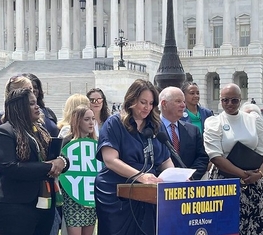LWVUS/EF Corporate Partnership and Gift Policy
LWVUS's policy for engaging with corporate partner requests.
Introduction
This policy applies only to the League of Women Voters of the United States and the League of Women Voters Education Fund. LWVUS/EF Boards use this policy to guide our work.
LWVUS shares this policy so that state and local Leagues may use it as an example for the development of their own policies, if they wish. LWVUS/EF is approached by many different groups and corporations during an election cycle, and we know that many state and local Leagues are often approached by potential partners as well.
The Policy
(For the purposes of this policy, “gift” is defined as cash, check, stock, or digital currency).
Whether planning strategic outreach to partners or choosing if and how to engage in the many corporate partnership requests LWVUS/EF receives in major election years, LWVUS/EF staff and board have a special obligation to carefully consider the potential opportunities, brand alignment benefits, and risks of any potential corporate partners.
Section 1. National Partnership Evaluation Criteria
When considering opportunities to pursue corporate partnerships, enter cobranded/sponsored marketing relationships, and/or accept financial support from corporate entities, LWVUS/EF staff will utilize these chief evaluation criteria to determine whether the partnership reflects the best interests of the League and advances our mission:
-
Does this partnership or gift advance our core mission, strategic framework, and/or operational goals, including DEI? If it doesn’t directly serve our goals or fill an existing gap, is it still worth doing for other reasons?
-
Will this partnership or gift directly benefit or engage our target audiences and/or underrepresented communities of voters?
-
Does this partnership or gift bring key increased visibility or revenue possibilities to LWVUS/EF? To state/Local Leagues? If not, why should we do it?
-
What specific added value can we offer this potential partner? How do our values and priorities align with theirs?
-
What requirements does LWVUS/EF have to make this beneficial to us? Are the benefits and outcomes measurable and achievable (dollars raised, voters engaged, new members generated, registered emails collected, etc.)?
-
What is the estimated staff time commitment for this partnership or gift? Is this opportunity worth making adjustments to work plans or other priorities in order to meet our obligations? Does our field have the capacity to meet the requirements? Is it worth that time investment?
-
Is this opportunity consistent with the needs and expectations of those who are stakeholders in this effort (funders, coalition partners, the public, engagers, League members)?
-
Would this relationship positively or negatively impact our ability to work with key partners or funders?
-
What are the risks? Has the potential partner engaged with work that does not align with LWV mission and values? Do they outweigh the potential benefits?
-
Could this partnership or gift cause reputational harm to LWV (from a DEI lens, nonpartisan policy, or other reason)?
-
How visible will this partnership or gift be? What is our commitment to elevating the partnership publicly?
Section 2. Review
- Internal Coordination. Key representatives from the Mission Impact, Communications, and Development departments will convene on an as-needed basis (more often during major election years) to evaluate specific partnership opportunities and any issues that arise.
- Protections. All written partnership/sponsorship agreements will include basic brand alignment and “opt-out” provisions.
- Prospects. A list of prospective and existing corporate partners will be provided to the LWVUS/EF Board on a quarterly basis for informational purposes.
- Risk Mitigation.
- Specific concerns about potential corporate partners, if any, will be brought to the CEO and Executive Team.
- CEO/President will determine whether and when specific corporate relationships require board consideration or approval.
- Chief Strategy Officer will determine when legal counsel consultation is required to evaluate potential partnership(s) and agreement(s).




